|
It’s that time of year where students set off for college, some for the first time and some going far away from home. These students take on the challenge of continuing towards adulthood and the process of making their faith their own. This can be a difficult road filled with numerous temptations, stresses, and other challenges. As someone who attended Catholic school for most of my life, I found the transition to college difficult, especially when it came to my faith. I attended a large public university where few practiced Catholicism, and I felt very isolated. The people who I attended Mass with at the beginning of the year began to slowly drift away – going to other churches or becoming too busy with academic commitments. With my class schedule it was hard to make it to the Catholic Student Union events and join the camaraderie. While I adjusted well to college life, I felt alone in my faith. Everyone has different experiences when it comes to the transition into colleges. Whether you are entering college for the first time, a current student wanting to get more in tune with your faith, or even a parent or relative of a college student(s), I’ve compiled some tips about keeping up with your faith life that can be helpful: 1. Make friends who challenge you to be your best selfMake friends wherever you go on campus, but remain close friends with those who continually challenge you to be your best. Many of my closest friends at college weren’t Catholic, yet they held me to remain true to my faith and myself without peer pressure. Just as a spouse is to help his or her partner grow in faith, so too should your friends. 2. Get InvolvedWhether you join the Catholic Student Union or other groups on campus, make sure you are busy. Becoming involved lessens homesickness and other temptations. Enjoy your college experience! 3. Go to Mass every SundayMark it on your agenda. Make sticky notes. Do whatever you need to do so that you attend Mass each week. Experiencing Christ every week in the Eucharist renews us and gives us strength. Fortunately, as Catholics we usually have a variety of Mass times to attend, so take advantage of that! 4. Challenge yourself and set goalsRegularly make short-term and long-term goals, and then try to stick to them. These can be anything from attending adoration regularly, going to daily Mass, setting aside prayer or Bible-reading time, or even studying abroad, trying new foods, and accomplishing a certain academic achievement. 5. Find time every day to pray and appreciate the beauty around youDoing this helps strengthen your personal relationship with God. Plus, you gain a better appreciation for life and develop practices that will stay with you after college. It’s not easy, but it matters that you try. 6. Call your family and your close friends one or more times a weekThese people are important foundations in your life. Keep them updated on your life in college and be honest with them. Your family and friends are a support system when things aren’t easy. 7. Find a MentorYour mentor(s) can be an academic, club advisor, older student, or religious. These individuals in your life can help you navigate college, your future, and strengthen your faith. (Plus letters of recommendation and internship/job advice are certainly helpful!) 8. Talk to people at your local church and get involved in the Mass Become a part of your new parish community at college. Get to know others around you to have that “home away from home.” This will help you make good life-long friends. Plus, getting involved in the Mass helps you become ingrained in the community while deepening your faith. 9. Search for a church you feel most comfortable going toFeeling at home in your college parish is important. Find a church that makes you want to go to Mass. The nearest church may not be your favorite – so explore! My favorite parish in my college town was about 15 minutes away and felt just like my home parish. 10. Find people to go to church with you Having someone to go to church with incentivizes you to go to Mass. Plus, it’s always fun having a buddy. Keep each other accountable! Make it a group event and have brunch or dinner after Mass, too! *This post was originally published on September 8, 2014.
0 Comments
Yesterday we celebrated the Memorial of Our Lady of the Rosary--a Feast Day that reminds of the important role that the rosary plays in our daily lives. It is a form of prayer that we seek when we are struggling and need the comforting embrace of a mother. It is a form of prayer that is joyful, celebrating our successes with Christ through Mary.
Devotions to Mary have always been an important aspect of my faith. In particular, the rosary has helped me through many tough times in my life and given me the strength to continue forming my life to Christ, but its importance was reinforced in the first few months of my college career when I joined the Knights of Columbus. Upon entering the Order, Knights are given a rosary as a symbol of our devotion to Mary and a reality of our reliance on her example and her intercession with God But why should we say the rosary? Saint John Paul II gives a clear picture of the rosary’s importance: “The Rosary mystically transports us to Mary's side as she is busy watching over the human growth of Christ in the home of Nazareth. This enables her to train us and to mold us with the same care, until Christ is “fully formed” in us.” When we pray the rosary, many of us are seeking the warm embrace of a mother, someone who can reassure us in our fears and give us the strength to live out each day for Christ. Mary is our mother in every sense of that word. Christ, moments from death, says to Mary, “Behold, your son,” and to the disciple whom he loved, “Behold, your mother.” With these words Christ gives Mary to all of us as our mother, the Mother of the Church, and with these words we are formed by her just as Christ was. The rosary does not pull our attention away from Christ, but rather joins us with him through our love of Mary. John Paul II tells us in Rosarium Virginis Mariae, “Never as in the Rosary do the life of Jesus and that of Mary appear so deeply joined. Mary lives only in Christ and for Christ!” The rosary allows us to participate in that union and calls us to share in the life of Christ through our relationship with his Mother. Each time we pray the rosary we focus on the Joyful, Sorrowful, Glorious, or Luminous mysteries. These are not only drawing us closer to Mary, but to the life of Christ as each set of mysteries is grounded in the Gospel. When we pray the rosary we do not just repeat prayers over and over again, but rather we are given the opportunity to live out a different aspect of the life of Christ with each decade. Repetition is an important aspect of the rosary, but is it actually repetition? Archbishop Fulton Sheen in his book “The World’s First Love” tells us that it is not repetition for each time we say the rosary, “we are saying to God, the Trinity, to the Incarnate Saviour, to the Blessed Mother: "I love you, I love you, I love you." Each time it means something different, because, at each decade, our mind is moving to a new demonstration of the Saviour's love.” Who better to remind us of the Christ’s love than Mary, the Mother of God, our mother, who raised Jesus, formed him, and followed him. Who better to emulate than Mary, who watched her son suffer and die on the cross for our salvation. Each time we say the rosary we are embraced by our mother, we are renewed in our faith, and we are reminded of God’s love. “Remember, O most gracious Virgin Mary, that never was it known that anyone who fled to thy protection, implored thy help, or sought thine intercession was left unaided. Inspired by this confidence, I fly unto thee, O Virgin of virgins, my mother; to thee do I come, before thee I stand, sinful and sorrowful. O Mother of the Word Incarnate, despise not my petitions, but in thy mercy hear and answer me. Amen.” *This post was originally published on October 7, 2014. Nicholas Shields is a young professional from Washington, D.C. 4/7/2020 Cooking During COVID-19: Ten Tips for Nourishing Your Body and Soul | COVID-19 ResourceRead Now“As chefs, we know that good food provides not only nourishment, but also comfort, especially in times of crisis.” -Chef Jose Andres When Hurricane Maria hit Puerto Rico in September of 2017, there was a great need for food- not just for the necessary nourishment, but also because “good food provides. . .comfort, especially in times of crisis.” Chef Andres and his team at World Central Kitchen provided 3.7 million fresh, never pre-packaged, locally sourced meals for the people of Puerto Rico as they recovered from Hurricane Maria. While our current situation in the midst of the COVID-19 pandemic likely doesn’t call us to produce millions of meals, Chef Andres’ thesis remains true—food brings comfort, especially in times of crisis. Chefs like Jose Andres and Andrew Zimmern were a large inspiration for me to pursue a degree in Culinary Arts. They helped me to see that food is not only tasty, a way to earn a living, and a creative outlet, but that it is a way to build community, to learn about culture, and to cultivate human bonds around our tables. Despite changing the scope of my career, food still plays a big part in my life. When I cook for friends and family, we are able to be together at table, just like Jesus invites us to. I see questions every day on social media from friends asking how best to cook this or bake that, for tips and tricks, so I figured I would provide some of my tips. So here are ten tips for cooking during the pandemic, quarantine, and crisis.
On March 7, my husband threw a surprise party to celebrate my 30th birthday. That would be the last time I would physically spend with many dear friends for at least a month. It was at the beginning stages of the coronavirus pandemic when the United States seemed to just barely be grasping what was going on across the Atlantic. We were aware but unafraid. The virus was like the flu. It only affected the elderly and those with compromised immune systems. It wasn’t a big deal. We would be fine. But around that time, my family began to take the notions of staying home, social distancing, and self-quarantining seriously. Each day brought more news. So we spent time outside. We tried to stay 6 ft apart. We bought a few more groceries than usual. We began to lay low. Almost three weeks later, I write from home, having gone “out” less times than I can count on my fingers apart from family walks, romps to open fields, or our backyard. No grocery stores. No movie theaters. No social events. No playgrounds. No libraries. No stores. No Masses. I haven’t had to “try” to make Lent this year somber or serious. Every day is a fast from something I deemed important to my life: a fast from physical friendship; a fast from community in the way I’m used to living it; a fast from outings, from the sheer independence of being able to step out of my house and go where I want to go when I want to. This fasting has been humbling. Prayer is the rhythm to my day. It is the breath of my days. The heartbeat. I watch online daily Masses or reflections on the Scriptures. I pray the rosary by myself or with my husband and children. I sing the Divine Mercy chaplet. I continue a novena. I make a spiritual communion with tears in my eyes. I utter supplications for others throughout the day. I offer my fasts—both the voluntary and involuntary—for our world. At the beginning of this Lenten journey, I shared how I thirsted to emerge from spiritual mediocrity. Now I thirst for God himself. I yearn to join the Body of Christ once again in the sacraments and receive him at the Eucharistic table. I live Paul’s exhortation to pray without ceasing in a profound way. And yet God has been so good. And peace prevails in my heart. I have so much to be thankful for: continued jobs and paychecks, long days of sunshine and warm weather, our health, food on our plates, a roof over our heads, snuggles with my children, reading books in our indoor tent, video calls with friends and family all over the country. In spite of everything, we are together. In spite of everything, God is here. In spite of everything, there is always hope. Let us continue to “rend our hearts” this Lent by turning to God and giving him everything we are feeling right now: exhaustion, confusion, anxiety, disillusionment, anger, despair, or fear. We can approach the one who became a vulnerable child for us and give him our own insecurities and vulnerabilities. At the manger, we will be met with his never-ending love. In his homily for the fourth Sunday of Lent, Fr. Mike Schmitz noted that God did not make an unbreakable world. Though he created perfectly, he instilled in mankind the ability to have free will—the ability to break our relationship with God by introducing sin into the human condition. Death, pain, suffering, temptation—all is the result of sin. This pandemic is more evidence of this truth. What matters, however, in the midst of our suffering, is that God does not abandon us to it—nor has he ever. Scripture recounts the story of God’s unfailing love for humanity since the Fall—a story of salvation that continues personally with each of us today. God does not promise fulfillment on earth, perfect joy, blessing, and comfort. He promises the cross, daily. But he also promises us that he will be with us always—even to the end of time—that he came to give life in abundance, that we can be transfigured, and that there is resurrection. He invites us to complete satisfaction and joy with him in Heaven for eternity. And in the meantime, as we continue on our own personal journeys in this “vale of tears,” he remains waiting for us at the well. Inviting us on the shore. Looking for our return on the horizon. Feeding us at the table. He remains pouring out all for us on the Cross. He remains. As we continue to navigate this Lenten season, the coronavirus pandemic, and the approach of Easter, let us go to him with humble hearts. “Let us allow ourselves to be loved, so that we can give love in return. Let us allow ourselves to stand up and walk towards Easter. Then we will experience the joy of discovering how God raises us up from our ashes.” -Pope Francis (Ash Wednesday Homily, 2020) Recently, my life has changed a lot. I had my first child, Vincent Scott Pierno, on January 31st, and he is the greatest joy I’ve ever known. I never knew that becoming a mother could fulfill my life in the ways it has, and I thank God each day for the happiness, tears, and everything in between that he has brought into my life. As a family, we’ve also started house-hunting and looking for a place to settle within this busy and chaotic Washington, DC area. My in-laws will be moving in with us, and although they’ve already been an amazing help with the newborn, it’s another change to our lifestyle. Finding joy in these changes has been challenging at times, but not impossible through the grace of God. I invite you to join me in reflecting on change in our lives and ways to find joy during times of trial and tribulation. One way to work through life’s changes is through Scripture. There are so many examples we can look to that give us strength and remind us of the goodness in change. One is Philippians 4:6-7, which says, “Have no anxiety at all, but in everything, by prayer and petition, with thanksgiving, make your requests known to God. Then the peace of God that surpasses all understanding will guard your hearts and minds in Christ Jesus.” This passage gives me hope. It can be anxiety-provoking to go through so many changes all at once, but Christ gives us strength and we can do all things with his help. Another verse from Joshua 1:9 that speaks of courage during a hectic time is: “I command you: be strong and steadfast! Do not fear nor be dismayed, for the LORD, your God, is with you wherever you go.” In Scripture, we look at examples of people who have also found change difficult and needed support from God. This reliance is the definition of faith: trust and dependence on God through all things, even when the end is not in sight. Another way to work through life’s changes is through prayer. In prayer we can develop a closer relationship with God, and in this dialogue find joy in knowing Christ more deeply. Prayer can be done in many ways: silently, out loud, in reflection, through journaling, and even through participating in the Mass regularly. Since prayer is “both personal and communal,” we can encounter Christ however we feel most comfortable. I’ve found that the most important part of this prayer is not to always ask God for things, but to offer thanksgiving and to listen. The “listening” is the hardest to do. The chaos of a busy and a constantly changing life makes it even more difficult during challenging periods to take time and listen to God. However, it is in those hard times that we can deepen our relationship with Him. The final way I’d really like to impart is by keeping track of and celebrating joy. In this age of social media and 24/7 news updates, it’s easy to see so much negativity all around us. People gossip about others, worry about things that have nothing to do with them, troll people online for their own enjoyment, and trash talk things that people don’t need to even have an opinion about. This negativity can seep into our daily lives and we can get lost in it. I invite you instead to be a whirl of positivity. As Catholics, we are called to action by being missionaries in the world. St. Vincent Pallotti suggests this in his teachings, and brilliantly states this saying, “Remember that the Christian life is one of action; not of speech and daydreams. Let there be few words and many deeds, and let them be done well.” I find his words timeless. The deeds that Pallotti refers to can be simple ones, such as celebrating anything good that comes into our lives by posting it on social media or encouraging joy in the lives of others. We could truly create small havens of joy for people to encounter by simply finding the joy that already exists. Share this joy and gratitude with at least one person, whether in-person or online. Some examples from my life include sharing in my son’s new life and looking for the good in being home with him rather than the stress. Even something as easy as a smile could change someone’s day. I invite you to use these hashtags when you post about your joys as we get through this life together in Christian spirit! #joyinChristianaction #findingjoyineverything #discoverjoyfulmoments Today we celebrate the feast of St. John Paul II, a saint of our times! He is remembered for many things, including his passion for the arts, outdoors, youth, and families. St. John Paul II also had a deep devotion to Mary, and in what I know of St. John Paul II’s life and loves, we can bring no greater joy in celebrating his sainthood than by honoring our blessed Mother. St. John Paul II’s favorite prayer was the Rosary, and I too, have developed a fondness for praying it. I stumbled upon a recording a couple of years ago in my desire to pray it intentionally. As I would listen and pray along in my car every morning before work, I discovered a love for each mystery and the fruit they bear, as like Mary, I “pondered them in [my] heart” (Luke 2:19, 51). The mysteries of the Rosary invite us to contemplate the life of Christ through the memories of Mary. St. John Paul II says remembering these mysteries “were to be the ‘rosary’ which she recited uninterruptedly throughout her earthly life” (Rosarium Virginis Mariae, §11). In this remembering, the account of the Gospel from the eyes of Mary are timeless, “not only belong[ing] to ‘yesterday’; they are also a part of the ‘today’ of salvation” (John Paul II, Rosarium Virginis Mariae, §13). In this, St. John Paul II reminds us that the Rosary is an invitation to participate in Christ’s divine life, and it is relevant across time to the faithful of all ages. Recently my routine for praying the Rosary has changed as I am now on maternity leave and spend the day taking care of my newborn daughter. Instead of rushing to get my two-year-old son into the car and dropped off at daycare before work and enjoying my prayer time alone in the car, we have the opportunity to hop in the stroller and walk to daycare, spending time together saying hi to neighbors and marveling at the changing of seasons before he starts his school day. Despite the enjoyment both my son and I get from these walks, in the transition of summer at home with mommy to school, and the transition from being an only child to living the realities of being a big brother at only two years old, for quite a few weeks my son was not happy about leaving home for the day. Although my son loves school, he was hating drop off, and his anxiety (and let’s be honest, mine, too) crept in the closer we got to school each day. One morning as I was trying to get him excited for the day, I asked him if he wanted to pray the Rosary with me, telling him it always brings me calm and comfort, and he said yes. I told him I would let my recording play, and I would tell him the stories of each mystery. Thus began a new routine for us each morning. As the Joyful Mysteries play, I tell him about how much Mary loved God that she said yes to being Jesus’ Mommy, and how we pray that we can love God like her and say yes to Him when he needs us to. When the Luminous Mysteries play, I tell him about Jesus’ first miracle, turning water into wine at the Wedding at Cana, and that through Mary, she will lead us to Jesus and help us see the miracles he’s performing in our own lives. In praying the Sorrowful Mysteries, I am very closely brought to tears as I think about explaining death to a toddler, and moved by Jesus’ sacrifice for us, telling my son that no sin stops Christ’s love for us. We pray to be good people and follow the will of God. And when we pray the Glorious Mysteries, I get to teach my son about the glories of the Holy Spirit and Heaven, praying for our ultimate happiness with Jesus, Mary, and all the saints. In praying these, I am in awe of how parenting is transforming my heart, teaching me to be like a little child, loving Jesus without abandon like my son does. By the time we’ve prayed our Rosary for the day, we’ve arrived at daycare. Filled with his spunky confidence and newfound graces, my son hops out of his stroller and says “let me give you a kiss for the road,” and sends me off on my way. Each day, he runs off to the playground to play with his friends, and I am amazed by the graces we’ve both received by praying the Rosary together. In his great love for both the Rosary and the family, St. John Paul II called families to pray this prayer together, acknowledging how its graces unite the family: Individual family members, in turning their eyes towards Jesus, also regain the ability to look one another in the eye, to communicate, to show solidarity, to forgive one another and to see their covenant of love renewed in the Spirit of God. Many of the problems facing contemporary families, especially in economically developed societies, result from their increasing difficulty in communicating. Families seldom manage to come together, and the rare occasions when they do are often taken up with watching television. To return to the recitation of the family Rosary means filling daily life with very different images, images of the mystery of salvation: the image of the Redeemer, the image of his most Blessed Mother. The family that recites the Rosary together reproduces something of the atmosphere of the household of Nazareth: its members place Jesus at the centre, they share his joys and sorrows, they place their needs and their plans in his hands, they draw from him the hope and the strength to go on. (Rosarium Virginis Mariae, §41) From daycare drop-offs to contemplating our family’s deepest sorrows and joys, we too as a family have found this hope and strength of the Rosary to be true and timeless. On this Feast of St. John Paull II, I invite you to honor him and our Blessed Mother by taking the time to pray the Rosary, finding twenty minutes of your time to devote to contemplating the face of Jesus. St. John Paul said, “a prayer so easy and yet so rich truly deserves to be rediscovered by the Christian community… I look to all of you, brothers and sisters of every state of life, to you, Christian families, to you, the sick and elderly, and to you, young people: confidently take up the Rosary once again. Rediscover the Rosary in the light of Scripture, in harmony with the Liturgy, and in the context of your daily lives” (Rosarium Virginis Mariae, §43). Know of my unending prayers for you as you begin this rediscovery of the Rosary for yourself, as with Mary, you too ponder these mysteries in your heart and recognize their fruits in your life. St. John Paul II, pray for us! Our Lady of the Rosary, pray for us! “The Advocate, the Holy Spirit…will teach you everything.” -John 14:26 After two years of dedicated study of theology, I received my Master’s degree. This has always seemed a bit odd to me, because I often feel I still have so much to learn. This seems like the case for Jesus’ followers as well. After 3 years of discipleship, they didn’t know “everything.” Though they could be considered the “masters” of Christian life–having spent three years walking alongside Jesus—Christ tells them they still need the Holy Spirit in order to learn “everything.” He was explaining to them a fundamental reality of the Christian life: it is a life-long process of learning. This reality is sometimes daunting, but more often it is comforting. The men that spent three years at the feet of Christ, who witnessed His miracles, heard His parables, and encountered Him after His resurrection, didn’t have it all together. They were not perfect at discipleship and they still needed God, who would now be revealed to them in the indwelling of the Holy Spirit. Rather than spending physical time with Christ, they would experience something even greater: God dwelling within them. This intimate and powerful presence of God is something we can experience today. We receive the indwelling presence of the Holy Spirit on the day of our baptism and physically receive Christ Himself every time we partake of the Eucharist. Furthermore, Christ tells us in this Sunday’s Gospel that He and the Father will dwell within those who keep His word. This comforts me because I have never heard Christ’s voice, seen His face, or shared His food. Though I am generations and millennia removed from Him, He has sent the Holy Spirit to teach me “everything”—what it means to follow Christ and live the Gospel today. Much like the disciples, I still have much to learn. Though I have grown up knowing about Christ and His teachings, though I have figuratively sat at His feet for more than three years, I still need the Holy Spirit to teach and remind me what it means to be a follower of Christ each day. And in order to cultivate the indwelling of the Holy Spirit, I must continue to keep Christ’s word. This is so much more than the study of theology. As Pope Francis said in a 2015 homily, "We can study the whole history of salvation, we can study the whole of Theology, but without the Spirit we cannot understand. It is the Spirit that makes us realize the truth or – in the words of Our Lord – it is the Spirit that makes us know the voice of Jesus." Learning everything, therefore, means knowing and discerning the voice of Jesus. A life of keeping Christ’s word looks different according to your vocation or status in life, but overall, some things that help us recognize Christ’s voice include an active sacramental life, daily prayer, acts of charity, reading Scripture, and living according to Church teaching. In the nitty gritty of every day, this could mean keeping your cool while driving in rush hour traffic, taking a meal to a family with a newborn, participating in the Sacrament of Reconciliation regularly, giving your spouse the benefit of the doubt, going to Mass each Sunday, or taking a deep breath when your child throws his food on the ground for the third time that day. It could mean reading the daily readings at the breakfast table, praying evening prayer with your roommates, starting a rosary on your commute, participating in a weekly Bible study. In short, keeping Christ’s word is a lifelong, daily decision to do things that bring you closer to Him and encourage you to hear His voice. As we prepare to celebrate Pentecost in a few weeks, let us call upon the Holy Spirit to be our Advocate and Teacher. May we have the humility to call upon Him daily as we pursue this lifelong life of discipleship in order to truly hear the voice of Jesus that says, “Come, follow me.” “Jesus returned from the Jordan and was led by the Spirit into the desert for forty days, to be tempted by the devil...” - Luke 4:1-13
In each of the Church’s Liturgical Seasons we have an opportunity to examine ourselves and reflect on different aspects of Jesus’s life. During Lent we create a space to reflect on His suffering and sacrifices. In today’s Gospel reading the Spirit led Jesus into the desert. For forty days Jesus lived in the wilderness, and faced the devil’s temptations. He was tempted with pride, power, and popularity; however, Jesus knew that He was called to follow God’s will and resist the empty promises the devil offered. I find comfort that the Holy Spirit led Jesus into the trial. The forty days were meant to prepare Jesus for the work that was to come, and a part of that preparation included temptations. Jesus relied on His knowledge of the scriptures and combatted the temptations with Truth. Turning a stone into bread seems like an innocent action, but Jesus knew that the temporary satisfaction would be empty and in defiance of God’s will. Jesus understands what it means to face temptation, and in His resistance provides a model of following God’s will that we should all ascribe to. Jesus was tested, and responded without sin. When I find myself facing a trial, I can draw comfort in the knowledge that the same Holy Spirit that led Jesus into the wilderness is in me. In His resistance in the wilderness, we have a foretaste of Jesus’s victory to come. At Easter we celebrate Jesus’s victory over death; in the meantime Lent provides us with a time to fast and prepare our hearts for the inevitable temptations of the world. Lent provides us with the opportunity to spend forty days in our own “wilderness”, fortifying our own hearts through sacrifice and prayer. FOCUS: COMMUNITY Throughout Lent we focus on all that Jesus has done for us. In today's Gospel we see that Jesus resisted each temptation, not just for Himself, but for us. Each of the temptations the devil proposed were designed to distract Jesus from His humanity. Each temptation involved Jesus using His divinity for personal gain and separating Himself from the human community. The temptation of individualism is something that we are all called to resist. The Lord created us as social beings with a responsibility to care for one another. WHO INSPIRES YOU TO SERVE? My Mom has always been a model of service I aspire to follow. She embodies the principle of placing others first, stressing to me and my siblings that “where your treasure is your heart will also be.” Mom’s treasure is rooted in the love she has for our community, and it is important to her that she actively invests her time to show the love. It could be as simple as caring for our school garden, or as involved as organizing our Church’s homeless outreach ministry. Mom has always found a way to make time for the causes that matter to her, and in doing so has shown the importance of committing time and resources to love others in her care for all of God’s Creation. PRAYER: Lord, you created us to love and worship. Help me cling to the truth that I am Yours in the midst of trials. When I walk through the valleys help me remember the joys from the mountain tops, and place my hope in the knowledge that Your will is for my good. Stir in me a heart that longs to discern Your will. Help me to work Your justice rather than personal gain every day of my life. Bless our bodies for Your service, and our service for Your Glory. To view the entire 2019 Lenten Guide, please click here. For more Lenten resources, please click here. Mara Scarbrough, Bon Secours Volunteer Ministry A second wind is often an unexpected gift. Whether it is discovered during a run, study session, or some other activity demanding intense focus and effort, what at first seems daunting and impossible to achieve suddenly becomes possible thanks to newfound strength and endurance. A second wind, while surely appreciated physically or mentally, can also be applied spiritually. As the Church celebrates her birthday on Pentecost Sunday, we can reflect on the incredible gift of the Holy Spirit who was sent by God Himself to provide the fledgling Christian faith a much needed second wind as apostles prepared to bring the Good News of Christ to the entire world.
One of the Gospel readings for Pentecost details our Lord’s promise to send the Holy Spirit to His disciples. In an earlier related chapter from John’s gospel, Christ Himself walks with the disciples and predicts His own Passion. He assures the disciples that they will not be abandoned as orphans, but will share in the very life of the Most Holy Trinity (John 14:15-31)! The consolation and comfort Jesus brought to those gathered in the Upper Room after His death and resurrection surely reminded them of this though He ordered them to not leave Jerusalem until “the promise of the Father” had been sent (John 20:19-23). It would not be until after Christ’s ascension, that the Holy Spirit would be sent upon the disciples and so enable them to carry out the Great Commission of our Lord, “Go therefore and make disciples of all nations, baptizing them in the name of the Father and of the Son and of the Holy Spirit, and teaching them to obey everything that I have commanded you.” While Christ had sent out the disciples to evangelize before (see Luke 10:1-20, cf. Matthew 10), these efforts were limited to “the lost sheep of the house of Israel.” Proselytizing the rest of the world would take place after the rejection of our Lord and would require grace to sustain the disciples through this incredible evangelical endeavor. Today, the faithful are not only entrusted with this mission, but have also been baptized and confirmed with the same Holy Spirit as was promised to Christ’s first followers! The Holy Spirit is truly God and is inseparable from the Father and the Son. Though Christ is seen, it is the Spirit who reveals Him. Thus, both are on a “joint mission” to reveal the visible image of the invisible God (see CCC 689). The Holy Spirit invites us to better know the Father and Son. Each person of the Trinity more fully deepens our understanding of God. As the Catechism says: Now God’s Spirit, who reveals God, makes known to us Christ, his Word, his living Utterance, but the Spirit does not speak of himself. The Spirit who “has spoken through the prophets” makes us hear the Father’s Word, but we do not hear the Spirit himself. We know him only in the movement by which he reveals the Word to us and disposes us to welcome him in faith. The Spirit of truth who “unveils” Christ to us “will not speak on his own.” (CCC 687) The Holy Spirit continuously reveals Christ to us when we make an effort to listen. Similarly, when we recognize and cooperate with the Holy Spirit dwelling within us, we are better able to contemplate Christ’s teachings and the great Mysteries of Faith. When we face discouragement or are unsure of a decision we must make, we are in similar circumstances to those waiting in the Upper Room. The gifts of the Holy Spirit strengthen our faith and helps us to judge our situations prudently. The courage to continue Christ’s mission and not be defeated by discouragement or rejection is not only an incredible witness to the Church, but also a recognition that the Holy Spirit continues to work among us wherever we are in our journey of faith! Just as the Holy Spirit descended upon our Lord at His baptism to start His mission on earth, so too did Christ send the Holy Spirit upon the disciples in the Upper Room as they began their ministry. Like the disciples, let us dare to be open to the Holy Spirit’s activity in our daily lives as a much needed second wind as we continue our Lord’s work so that at the end of our days, we may hear spoken to us, “Well done, my good and faithful servant ... Come, share your master’s joy.” Question for Reflection: Can you recall a moment when the Holy Spirit gave you the courage to continue through a difficult trial? Can you sense something’s coming? Throughout Lent, we’ve had the opportunity to empty ourselves in prayer, fasting, and almsgiving; we have mirrored Christ’s journey in the desert after His baptism. These past forty days have called us to remember to turn to God for His grace in our lives and for a spiritual renewal to cleanse us of all that distracts us from Him. While pouring ourselves out spiritually takes time to occur and be effective, so too should we scrutinize how we are replenishing ourselves in preparation for Easter.
The Church is on the verge of commemorating the week that changed the world: from Palm Sunday through Easter Sunday, the faithful are especially mindful of Christ’s ministry and example in the days leading to His crucifixion, entombment, and Resurrection. Although it happened two thousand years ago, the significance of Christ’s life and death can never be taken for granted or downplayed! What it accomplished for us, the atonement of humanity’s impossible debt by God Himself, continues this very day to be imbued with all the raw power, emotion, and sacrifice that Christ’s followers experienced in those days. Today, these holy days afford us the chance to walk with our Friend[1] once again: to withstand persecution with Him, to unite our sufferings to His sufferings, to be wounded in the shadow of His sacred wounds, and to forgive transgressors as He did from the Cross. No, Lent is not meant to be easy, but when we give our past failings or shortcomings over to the Lord during this time, He helps us walk with Him on His journey to Calvary and ultimately, to His Heavenly Father. In dying with Him, we rise with Him (2 Timothy 2:11-13). This period of Lent can be very refreshing and renewing if we let the process take place! When we give up a comfort of ours or develop an aspect of our spiritual lives, we force ourselves to re-evaluate our faith in God and trust in His Providence. Lent helps transform us and pushes us to grow in holiness. For one, we can make sure we are doing things for the right reasons. In addition, we can better understand our dependence on things we seek for happiness or comfort, be they lesser things or God Himself. The point of our Lenten prayer, fasting, and almsgiving is not an endless wallowing in self-pity, but preparation to welcome the Risen Lord who, by His supreme salvific Act, never ceases to fulfill us. On Easter Sunday, the Universal Church will rejoice once again because her Bridegroom has gained for her eternal life over death and suffering. If you feel as if your Lent has not been the best experience, don’t worry! Take time to reflect on your shortcomings and resolve to make real efforts to turn away from the sin and other distractions keeping you from God. He is ready to embrace you no matter your state in life and will never disdain true repentance. It is not too late to join Him on His journey to Calvary—He simply desires your companionship and will help you bear your own cross, as He did with Simon of Cyrene. Alongside Him, you may struggle, fall, and have to pick up your cross again and again. With Him, you may be lifted up as an object to be misunderstood or ostracized by others. But by dying to yourself for love of our King, you will be raised on the last day to reign with Him in Paradise. Perhaps—as the local authorities in Jerusalem sensed over two thousand years ago and the Church of Rome knows now and always—something indeed is coming, and we must rise from our ashes, pettiness, emptiness, and brokenness to meet it as promised to us by the God of Heaven and Earth Himself: ‘But arise, let us go hence. The enemy brought you out of the land of paradise; I will reinstate you, no longer in paradise, but on the throne of heaven. I denied you the tree of life, which was a figure, but now I myself am united to you, I who am life. I posted the cherubim to guard you as they would slaves; now I make the cherubim worship you as they would God. The cherubim throne has been prepared, the bearers are ready and waiting, the bridal chamber is in order, the food is provided, the everlasting houses and rooms are in readiness; the treasures of good things have been opened; the kingdom of heaven has been prepared before the ages.’ Questions for Reflection: Has your Lent been a fruitful and transformative one? If not, what are some ways you can use Holy Week as a preparation for Easter Sunday? For more resources on Lent and Easter, please click here. When my husband and I were preparing for marriage, we spent time in reflection and prayer carefully choosing our Mass readings. It was such an exciting decision to make, and we prayed that the readings would reflect and inspire us in our marriage and all whom we would witness to by our marriage. Some of these same readings will be read at Masses across the world on the upcoming feast of the Holy Family, serving as a reminder of how we can live as reflections of the Holy Family in our daily lives. In the second reading, Paul tells the Colossians, “Put on, as God's chosen ones, holy and beloved, heartfelt compassion, kindness, humility, gentleness, and patience” (Col 3:12). Just like Mary, Joseph, and Jesus, we are God’s beloved, chosen and loved by God, and with that, we are called to live by these same virtues that Paul shares with the Colossians. The stories of Mary and Joseph consistently show us their lives of humility and gentleness. I think of Mary’s fiat (Luke 1:38), Joseph’s obedience to the angel of the Lord (Matthew 1:24), or how Mary and Joseph took Jesus to be presented in the temple in this weekend’s Gospel (Luke 2:22-40). Just like Mary and Joseph, we are called to serve and love God with faithfulness that is radical, but gentle and sweet. What does this faithfulness look like? For the Holy Family, not only did it manifest in the stories we read about in Scripture, but also in the mundane moments of the every day. Mary nursed Jesus as an infant, Joseph taught him carpentry, and Jesus served his parents and brought them joy! Jesus carried this love in his ministry that nurtured all to whom he preached, and it continues to carry on in the legacy of the Church. These little acts of faithfulness yielded enormous fruits and carried the Holy Family through times of immense suffering. As I feel overwhelmed with my day to day duties of family life as a wife and mother, or my job as a teacher, I find comfort in knowing that perhaps Mary and Joseph felt these demands, too. They were faithful to their vocations, to each other, and to the Lord. Life is a balancing act, but with “Christ dwell[ing] in you richly,” like the Holy Family, all can be done in love, “do[ing] everything in the name of the Lord Jesus” (Col 3:17). You show faithfulness when you do the dishes, when you submit an assignment for work or school, when you make the bed. You show faithfulness when you play with your children, when you have coffee with a friend, when you stop and pray. You show faithfulness when you show up to Mass. Opportunities for faithfulness, humility, and gentleness are in the every day, both big and small. Through these opportunities for faithfulness I have learned that God is never outdone in generosity. He wants to bless us and let us know His love, and He does this in the most profound way when we show Him our faithfulness and love, just as the Holy Family has modeled for us. As we continue to navigate the demands of our daily lives, let us cling to the intercession of the Holy Family, that we may be gentle and humble, showing radical faithfulness in all that we do. Question for Reflection: What are some opportunities to show for faithfulness in your life? For more resources on Marriage and Family, click here. Alyce Shields is a teacher in Washington D.C.
During college, I had a professor with a reputation for being extremely challenging. Upperclassman students would warn us as freshman: “whatever you do, don’t take him! You will work more in his class than you ever have before!” I vividly recall one chilly, December afternoon walking by this professor’s office and watching students storm out from it, visibly angry. “Not good,” I thought to myself. It would certainly be easier to continue to breeze by in my classes than to be challenged. My senior year, against all advice, I decided to enroll in this professor’s class. The warnings from the upperclassmen were correct. He was difficult and challenged me to grow in my craft like no educator before had ever challenged me. And for that, I am forever thankful. How can you grow without being challenged? I am only the professional I am today because my professor was dissatisfied with the status-quo. He knew his curriculum would be difficult, but he believed that each of his students could achieve more, even though it was uncomfortable and challenging. He wanted us to excel rather than simply get by. As I reflect on Pope Francis’ upcoming 81st birthday and give thanks to God for his ministry, I see some similarities between him and my professor. One of our Holy Father’s greatest gifts to the people of God is that he challenges us to be uncomfortable with the status-quo, with “maintenance mode.” In Evangelii Gaudium, Pope Francis exclaims: “In our day Jesus’ command to ‘go and make disciples’ echoes in the changing scenarios and ever new challenges to the Church’s mission of evangelization, and all of us are called to take part in this new missionary ‘going forth’. Each Christian and every community must discern the path that the Lord points out, but all of us are asked to obey his call to go forth from our own comfort zone in order to reach all the ‘peripheries’ in need of the light of the Gospel.” Pope Francis, much like my professor in college, presents us with a challenge because he knows that the Church’s potential is incredible, even if this shift to mission mode is not easy. Convincing our colleagues and community to move from maintenance mode to mission mode, however, can be difficult. Some parish leaders I have encountered argue that their parish has always done something in a certain way and that if they changed it half of their parishioners would leave the parish. Nevertheless, in Evangelii Gaudium, Pope Francis reminds us that: “Pastoral ministry in a missionary key seeks to abandon the complacent attitude that says: ‘We have always done it this way’” (EG, no. 33). The only way that parishes will become missionary communities that are focused on going forth to form missionary disciples is by shedding their contentedness with the status-quo and aversion to conflict at all costs. Pope Francis continues, “the word of God constantly shows us how God challenges those who believe in him ‘to go forth.’” Let us then turn to God and his Word in order to have the courage to go forth! Moving from maintenance to mission will be uncomfortable, but, as Pope Francis prophetically reminds us, is our calling as followers of Jesus Christ. Please join me and the Catholic Apostolate Center team in wishing Pope Francis a very happy and blessed 81st birthday, which he will celebrate on December 17th! For more resources on Missionary Discipleship, please click here. Being comfortable with dependence is a struggle for me. I absolutely hate to be a burden on anyone. In fact, my family constantly reminds me that it’s OK to ask for assistance and guidance. Several years ago in college, for example, I began to have car troubles that created a need for help with transportation. My parents reminded me that my friends would be there for me to lean on, reassuring me that they would in fact be glad to help. I was pleasantly surprised when each friend I asked for help gave a resounding, “Of course!” Self-reliance seems to be a virtue valued by society because we are taught that it is better to give to others than to take. But when taken too far, the negatives of this quality actually erode our trust and relationships with other people, as well as our desire for God. In the Acts of the Apostles, we learn how the members of the early church relied upon one another and became stronger because of this support. We are humbled when we rely on others and on God, but we are also brought closer together as a result. Recently, I read about Jabez’s prayer in the Bible. Jabez calls out to God asking, “Oh, that you may truly bless me and extend my boundaries! May your hand be with me and make me free of misfortune, without pain!” Jabez turns to God in prayer, showing strength in dependence on God. Dependence is synonymous with prayer. It requires humility, an acknowledgement that we need God to help us grow and become more like him. 1 Peter 5:7 says, “Cast all your worries upon him because he cares for you.” God wants us to ask for his blessings in prayer, to strive for big goals and dreams, not settle for mediocrity. But in all we do, we are called to glorify the Father, just as Christ did on earth. Although not every one of our prayers is answered in the way we ask, God does hear each one and answers them in some way. Sometimes, an answer may come in the form of hardship or suffering. Conversely, an answer may come in the form of silence. Other times, an answer may come as blessings, an “extension of boundaries.” Regardless of the outcome of our prayer, God invites us to depend on him in the midst of any situation we may find ourselves in – whether we are in a position of strength or weakness. With time, experience, and prayer, God continues to show me how to reach out to others as resources and guides. Over the summer, I began to pray something like Jabez’s prayer. I had asked God for ways to help me become more connected to my parish, and he responded by having a pastoral associate invite me to help form a young adult ministry in the parish. I reached out to other young adult ministry leaders who offered their suggestions and advice, and they put me in contact with other diocesan leaders who were wonderful resources as well. Several friends also offered their support for the ministry and have helped to form a core planning team. Since the ministry had its first event in September, I encounter someone new looking to join or share the ministry with someone else several times a week. We’ve even had other parish ministries ask how the young adults can help be part of their evangelization missions. Our territory is enlarging, as Jabez would say. God, and other people, want to help us and be a part of our lives – we just have to ask. Questions for Reflection: Can you think of a time when you had to rely on the generosity or goodwill of others? How did it make you feel? “I am the resurrection and the life, says the Lord; whoever believes in me, even if he dies, will never die.”
Today’s Gospel challenged my understanding of what it means to be compassionate. When Jesus learned that a loved one was ill, He responded in a peculiar manner. He didn’t rush to the sick one’s side or hurry to comfort His beloved’s family. Rather, He waited two days. Why did He wait two days? I sure wouldn’t have done that. If He knew all along that He would raise Lazarus, why would He prolong the wounded agony of Mary and Martha? How could Jesus desert those He loved in their moment of need? It seems almost like a test, a cruel and unnecessary test. Yet I suspect Jesus had a different intention. By waiting two extra days He was not punishing or testing Mary and Martha but inviting them to examine their own brokenness. The idea of resting in brokenness, rather than avoiding it, has been a particularly challenging concept for me. I first encountered it in Bryan Stevenson’s book Just Mercy, in which Stevenson says “We can embrace our humanness, which means embracing our broken natures and the compassion that remains our best hope for healing. Or we can deny our brokenness, forswear compassion, and, as a result, deny our own humanity.” It seems that Jesus chose the former. When He finally arrived in Bethany and witnessed the woundedness of those He loved, He “became perturbed and deeply troubled.” Then, “Jesus wept.” Knowing that Jesus wept helps me reclaim my own brokenness and affirms that truly embodying compassion requires entering into the chaos of woundedness, both my own and that of the “other” person. Prayer: God of grace, help me rest in my woundedness. When I feel most alone and deserted, remind me of Jesus’ constant refrain “Do not be afraid.” Help me remember that Jesus Himself, the almighty Son of God, wept for the pain of His community. Let me never forget that one of Jesus’ greatest miracles of raising Lazarus from the dead was precipitated by His solidarity in suffering with those He loved dearly. Amen. Focus on: Social Justice How have you been wounded by the, as Dr. Martin Luther King Jr. puts it, “sickness of racism, excessive materialism, and militarism?” How can you – and your surrounding communities – enter into this brokenness and encounter healing compassion? Service Inspiration: My mother, Sue, understands part of my volunteer experience, but struggles with other components. However, I recently babysat for a colleague’s children, a two-and-a-half year old and a six-month old. When I left, I was exhausted. I realized later that I watched two boys the same age difference as my brother and I, but only for a few hours. My mom did it for years, and then became my teacher and homeschooled us. She served as an enormous role model, never asking for thanks or recognition, silently taking on her children’s struggles. She is an inspiration and reminder of Jesus here on Earth. *This Lenten reflection was originally published on the Catholic Volunteer Network Blog and was posted with permission. Greg Hamilton attended Saint Michael’s College in the grace-filled Green Mountain State of Vermont and is currently serving as a Jesuit Volunteer in Washington D.C. at the Campaign for the Fair Sentencing of Youth. Most days, Greg finds a way to involve his favorite poet, Mary Oliver, in his routine. Deus Caritas est: God is Love. How many times have we heard this simple yet profound theological truth in a homily, story, or teaching? How many times have we taken this for granted? In a world where truth often seems subjective, God’s love remains a refreshing and comforting constant in the Christian life. If this were not so, for what purpose, let alone by what means, would you or I exist? It is this perfect love of God which sustains us each and every moment of eternity. In fact, it’s God’s very nature, so bursting with love, that wills us into being. So too must our love for our neighbors guide and give purpose to our lives. The liturgical season of Lent is an especially wonderful opportunity for us to reorient ourselves towards God’s love and mercy. As we prepare to celebrate the ultimate expression of love the world has ever known this liturgical season, we may give up something we fleetingly desire in order to be made more aware of our need to depend on the One Love, the True Love, the Infinite Love. Of course, we can do more throughout Lent, but take to heart the suggestion of my bishop: [T]his Lent, fast and abstain when the Church requires it; give something up to make room for God and his mercy to fill you. Pray more and pray deeply and whenever you can because God listens to you: prayer puts you in touch with God and his mercy. Do something good for someone else every day; resolve to care about someone else every day, because God does, Jesus does and wants you to be like him, loving and full of mercy. Don’t make this Lent a complicated regimen of resolutions and promises that will unravel a week from now. Make it simple. Make it real. [emphasis added] Lent is not a time of self-pity or bemoaning our spiritual shortcomings. To fail to acknowledge God’s willingness to have mercy and forgive the sinner of his or her faults places sin as the end without further hope of relief, restricts one’s view of God as having limits on his love, and risks committing a sin against the Holy Spirit (i.e. believing that the magnitude of a sin is greater than God’s power— and continuous willingness— to forgive [cf CCC 1864]). While Lent brings to mind the classic images of sackcloth and ashes, the Lord desires something much more personal than just the recognition of our sins—“sincere, heartfelt repentance, change of heart, conversion” is what each of us is called to offer the Lord with the same Love He offered to those He encountered in His earthly ministry and ultimately from the Cross. “I desire mercy, not sacrifice,” our Lord, echoing the words of the prophet Hosea, declares to the Pharisees during the calling of Matthew (cf. Hosea 6:6) For us today, these words still ring true. Lent is not an easy time, but it invites us to shake us out of our spiritual complacency if we are to answer the Lord’s call to conversion. This may be uncomfortable. Receiving the ashes on our foreheads tomorrow, however, signifies our commitment to God that we will endeavor each day—and not just until Easter Sunday—to change our lives to be (once again) oriented towards God in avoidance of the sin and distractions which lead us away from His love. While we seek forgiveness from God, we are also to freely forgive others, “And forgive us our debts, as we also have forgiven our debtors.” Even if we fall along the way, the important thing is to pick ourselves up and start again— the Lord is patient! In closing, let us reflect on a final word from the Venerable Fulton Sheen: God loves you despite your unworthiness. It is His love which will make you better, rather than your betterment which will make Him love you. … Say to yourself over and over again, regardless of what happens: “God loves me!” And then add: “And I will try to love Him!” (Fulton Sheen, Remade for Happiness: Achieving Life’s Purpose through Spiritual Transformation (San Francisco: Ignatius Press, 2014), 187, 25.) |
Details
Archives
July 2024
Categories
All
|
About |
Media |
© COPYRIGHT 2024 | ALL RIGHTS RESERVED



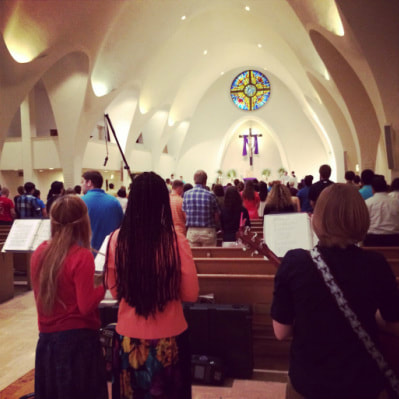



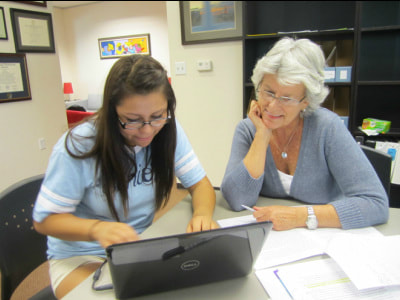
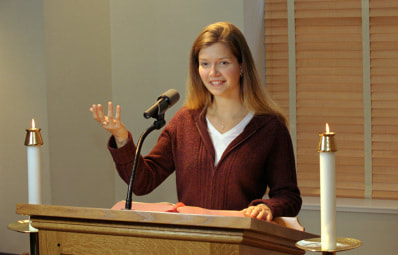
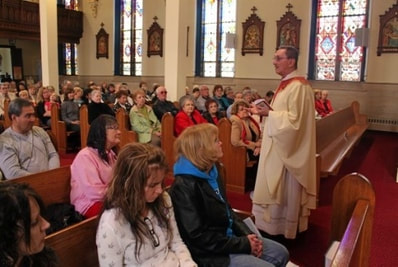
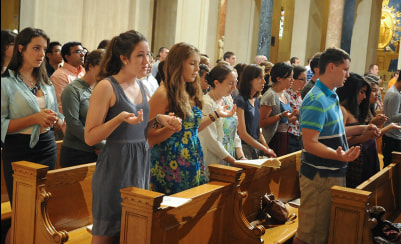

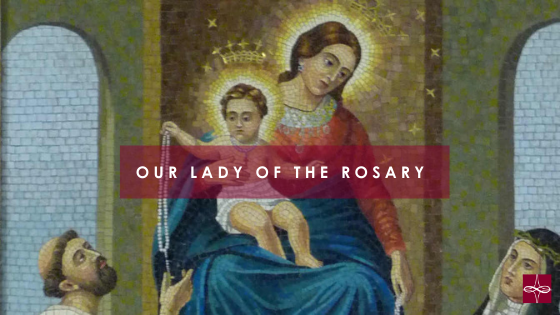






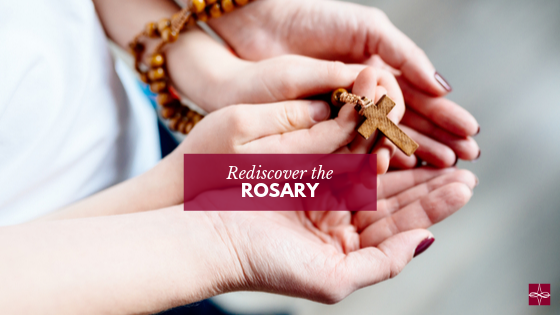



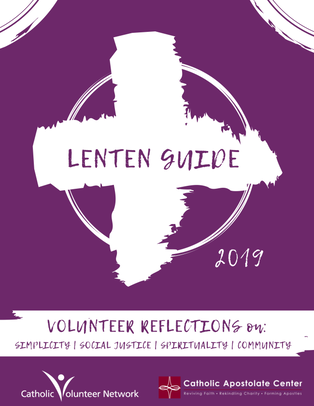
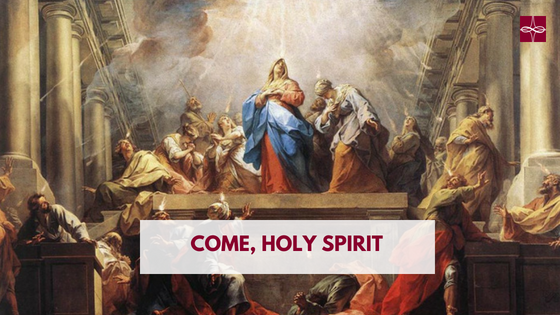

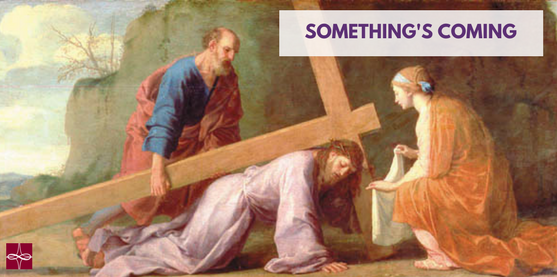


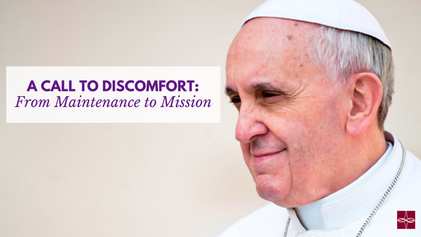



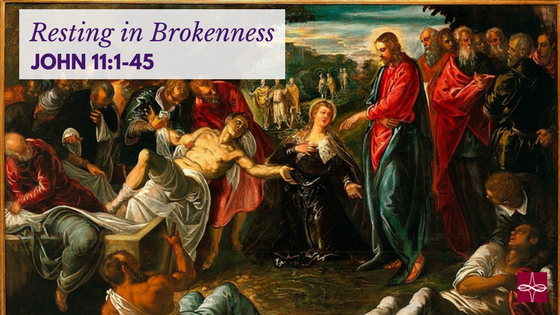
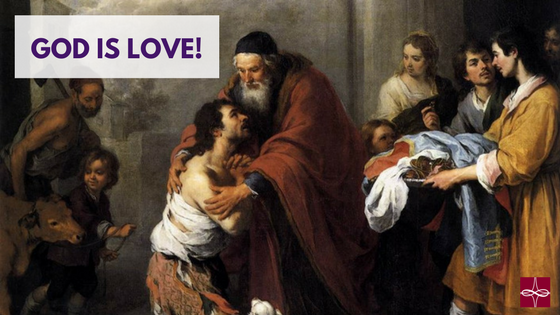

 RSS Feed
RSS Feed